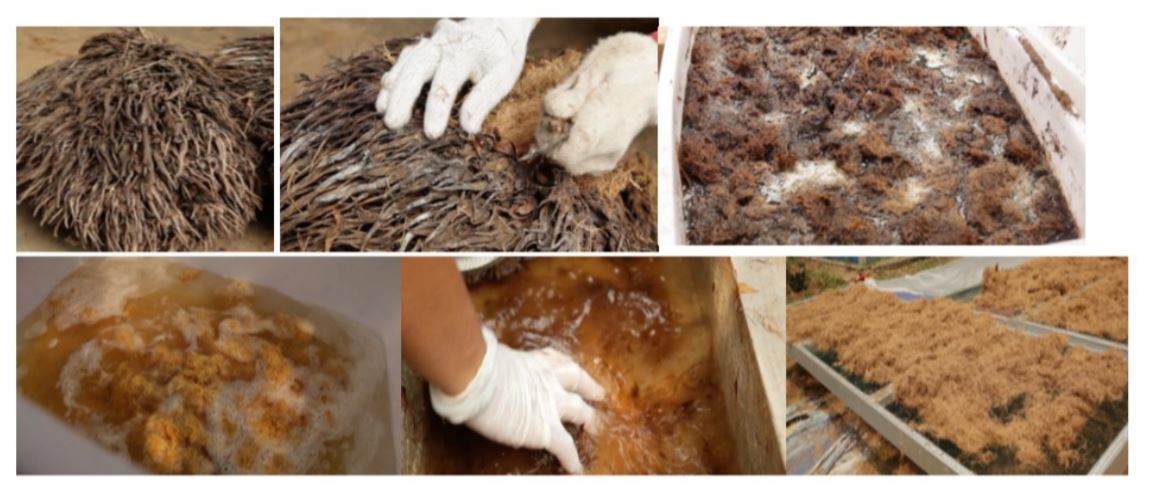
TKKS fiber as organic fiber
TKKS fiber as organic fiber




Background and Description
The existence of innovations to increase the acceleration of the number and variety of downstream products of palm oil and its derivatives, especially the utilization of TKKS biomass with processing technology that is integrated from upstream to downstream and can be scaled up by SMEs, cooperatives, industry is a strategic role in increasing added value, inhibiting the rate of imports to support sustainable development goals, and diversify competitive palm oil products. This innovation is TKKS (lignocellulosic) fiber in various sizes and orientations as an organic filler to replace synthetic fibers of glass fiber, nylon, Kevlar, etc. Oil palm empty fruit bunches (TKKS) are one of the biomass in palm oil production that has great potential in substitution of synthetic fibers (23% per tonne of fresh fruit bunches). Its abundance is in line with the human need for vegetable oil sourced from palm oil so that feedstock for commercialization can be guaranteed. Currently, the use of TKKS in the application of bioplastics, NCC, fertilizers, charcoal, etc. has been widely carried out, but the presence of this waste is still an obstacle for the CPO industry in Indonesia.
Implementation
The implementation process in an integrated manner involves SMEs through the transfer of knowledge, technology, and methodologies of modification of TKKS fiber material. Short fiber production involves PT Politech Indonesia which is applied as an organic filler to strengthen the mechanical properties of the Green Composite IPB helmet and automotive components. Long fibers are produced by PT Interstisi Material Maju to be used as woven and non-woven fibers for bulletproof applications. Implementation to the village community in the production of woven fiber is carried out at the Bintang Terang Majalaya Cooperative, Bandung. This has the impact of opening up new job opportunities by encouraging the growth of SMEs producing palm oil solid waste fiber.
Result and Impact
The technological innovation of the organic filler production process must be easy to adopt and scale up by industry players. Therefore, the results that have been achieved are optimization of the TKKS fiber production process with simple, effective, low production costs, and environmentally friendly methods. TKKS fiber in long, short, microparticle, woven, and nonwoven fiber sizes is the output of variations in the size and orientation of TKKS fibers that can be used by the biocomposite industry to replace synthetic fibers. Accepted papers in journals are the result of contributions to the scientific community, especially in the mastery of material science and technology. All of the products have an impact on the benefits as an exploration of Indonesia’s natural wealth, especially the handling of solid waste to support the development of the national material industry.
Challenges and Lessons Learned
The availability of Indonesia’s natural wealth should be able to provide organic filler raw materials for the national polymer and composite product industry. Indonesia’s dense population and position in Asia are advantages in the market and trade sectors. However, the low downstreaming of innovation and the competitive position of national technology cannot stem the rapid rate of imports, so the competition in the domestic market is getting tougher. This is a challenge in the downstreaming, and market of this research innovation product. The existence of an effort to increase the acceleration of the number and variety of products in the field of organic filler sourced from the use of TKKS is an innovation in increasing the diversity of other organic raw materials such as cotton, kenaf, hemp, etc.
Solving the problem of solid palm oil waste nationally into high-economy products is the main challenge in this innovation. The extent of oil palm plantations in several parts of Indonesia can meet the needs of raw materials, the challenges are distance and shipping transportation so that collaboration in the processing process is needed to approach the source of raw materials.
Replicability
TKKS fiber of various sizes and orientations has been produced in tonnage capacity through the cooperation of partners and PTPN VIII as the provider of raw materials. The product standard uses TAPPI and ASTM mechanical properties testing which is carried out periodically and sampling. Currently, production is ongoing for the fulfillment of GC helmet products, particle board, and bullet-proof materials. Cooperation with TKKS fiber manufacturing partners in Jambi and Palembang is being explored. The marketing process and the use of fiber in a wider application are managed by PT IMM as a tenant of IPB’s start-up company. Developments continue to be carried out on fiber quality and diversification through research in Physics, FMIPA IPB.


